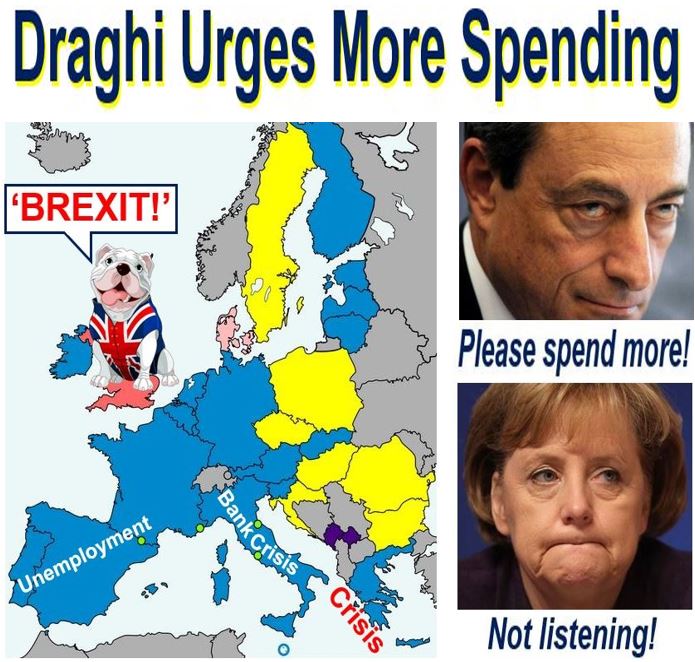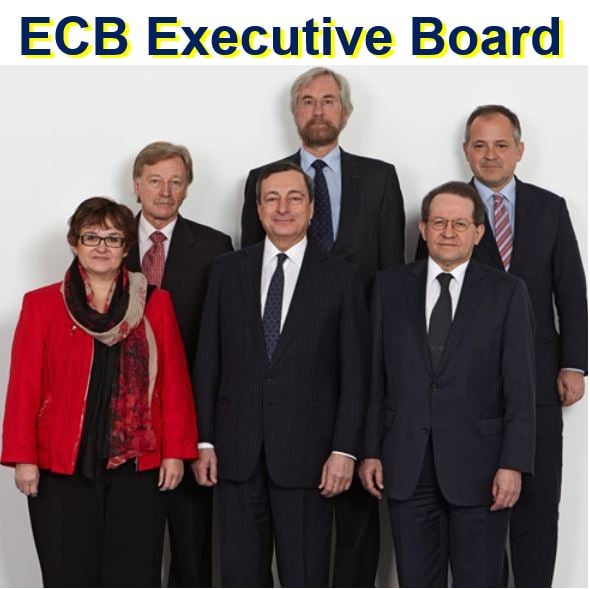European Central Bank boss Mario Draghi says EU governments must do more to boost the economy of the Eurozone after the region’s already fragile recovery is further undermined by Britons’ decision to leave the economic bloc.
Mr. Draghi says that the threat of an economic downturn has grown considerably since June 24th, when the Brexit referendum result was announced. Brexit stands for Britain Exiting from the European Union.
The Japanese, British and Chinese governments have already begun easing their fiscal stance or given clear signals that they plan to do so as near-zero inflation and sluggish global growth show that the mega-easy monetary policy of the major central banks has hit a limit.
When a central bank adopts an easy monetary policy, it keeps interest rates as low as possible.
 Mario Draghi is urging leaders to get their governments to spend more – but none of them are listening.
Mario Draghi is urging leaders to get their governments to spend more – but none of them are listening.
ECB unlikely to change stance
Economists and analysts doubt that the European Central Bank’s (ECB’s) Executive Board will alter its monetary stance when they meet on Thursday, 21st July – it will be their last meeting before their two-month summer break.
Mr. Draghi can carry on urging governments to spend more and accelerate their growth-encouraging reforms until he is blue in the face, however, so far his words have fallen on deaf ears and are likely to do so again.
The only Eurozone nation with any sizeable fiscal ammunition is Germany, a country that is not going to give up its budget surplus any time soon. In the absence of greater power-sharing, Germany is not interesting in pooling more money at the European level.
Given that country leaders and their cabinets are unlikely to heed any of Mr. Draghi’s words, the burden of responding to the shock of the UK voting to leave the EU will remain with the European Central Bank.
 The Executive Board of the European Central Bank. (Front from Left) Sabine Lautenschläger, Mario Draghi, Vítor Constâncio, (Back from Left) Yves Mersch, Peter Praet and Benoît Cœuré. All members are appointed by the European Council. (Image: European Central Bank)
The Executive Board of the European Central Bank. (Front from Left) Sabine Lautenschläger, Mario Draghi, Vítor Constâncio, (Back from Left) Yves Mersch, Peter Praet and Benoît Cœuré. All members are appointed by the European Council. (Image: European Central Bank)
Gulf News quoted BNP Paribas economists who said:
“We fear, therefore, that Mr Draghi’s calls for a loosening of the purse strings will go unheard, at least for now.”
“As things stand, then, the burden of responding to the Brexit shock will remain with the ECB, which is all too aware that it has fewer and fewer tools with which to respond.”
Greater spending is not something just Mr. Draghi has been urging; José Ángel Gurría, head of the OECD, and investor George Soros are both stressing the same.
In parts of the Eurozone, where unemployment is stubbornly high and economic growth is virtually at a standstill, the need for further stimulus is particularly evident. Peripheral countries that abandoned their own currencies and adopted the euro are experiencing growing resentment toward the European currency project.
The Eurozone peripheral countries include Greece, Cyprus, Malta, Portugal, Ireland, Spain and Italy.
New opportunities for public investment have emerged recently as government borrowing costs on the bond markets have declined.
However, there is little to suggest so far that the Eurozone nations’ fiscal stance is about to loosen significantly.
Sanctions for Spain and Portugal
In fact, two nations struggling to emerge from a deep economic and financial crisis – Portugal and Spain – are to be sanctioned for not doing enough to correct their giant budget deficits last year. EU finance ministers agreed to the penalties.
The vote by the British electorate to get the UK out of the European Union came as a surprise to most Britons and their counterparts in the rest of the continent. When the result was announced on 24th June, the pound sterling slid from $1.50 to $1.30 – nearly by 13% – and has struggled to make a comeback.
European Union nations are concerned that until the UK’s status becomes clear, there will be a freeze on investments across the trading block. Investors hate uncertainty, and rarely invest their money in places where nobody knows what is going to happen next.
Britons fed up with voting
The prospect of a second referendum or even an early general election in the UK is becoming less and less likely. A poll earlier this week showed that Britons’ are sick of democracy for the time being and want their government to do its job and get on with things. In 2016, apart from the EU in-or-out referendum, there was also a general election.
Brexit free-trade deals planned with the USA and Australia https://t.co/61bHN3CLDj#Brexit
— Stop the EU (@Stop_The_EU) 17 July 2016
During the first 48 hours after the referendum, many people who voted to leave wondered whether they had made a mistake after seeing the stock market and their currency take a nose dive.
However, as the prospects of trade deal talks with the United States, Australia and other powerful nations emerge, enthusiasm for Brexit is beginning spread across the country.
Is UK’s future in NAFTA?
Several Republican lawmakers in the United States are urging their government to show solidarity to the UK, America’s most important ally, by starting trade talks immediately, or even inviting Britain to join NAFTA (North America Free Trade Agreement).
US Republican House Speaker Paul Ryan said during an interview in Wisconsin that he supports a free trade deal with the UK after it has separated from the EU.
 Is the UK’s future in NAFTA, the North American Free Trade Agreement?
Is the UK’s future in NAFTA, the North American Free Trade Agreement?
Many American politicians think that NAFTA, a free trade area with no EU style ever-closer union worry – something Britons are not keen on – might be just what the UK is looking for. In fact, members of Congress in the 1990 had initially pushed to include the UK in NAFTA.
The United States is Britain’s most significant trading partner by country – the EU is by region. Last year, the US exported $56.1 billion in goods to the UK and imported $50 billion.
Britain enjoys a record $587.9 billion in US foreign direct investment as of 24 months ago. British foreign direct investment in the United States stands at about $448.5 billion. British companies employ approximately 1.1 million Americans, while US companies employ more than 1.2 million UK workers.
Writing in Fox Business, Elizabeth MacDonald says that expanding NAFTA to include Britain could be done alongside the US talks with the EU on TTIP (Transatlantic Trade and Investment Partnership).
Video – Brexit and the Eurozone economies
European Union finance ministers warn that the UK’s decision to leave the trading bloc will further damage an already fragile Eurozone economy.
